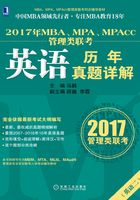
2015年真题详解
In our contemporary culture, the prospect of communicating with-or even looking at-a stranger is virtually unbearable. Everyone around us seems to agree by the way they cling to their phones, even without a 1 on a subway.
It's a sad reality-our desire to avoid interacting with other human beings – because there's 2 to be gained from talking to the stranger standing by you .But you wouldn' t know it, 3 into your phone. This universal protection sends the 4 :“Please don' t approach me. ”
What is it that makes us feel we need to hide 5 our screens?
One answer is fear, according to Jon Wortmann, an executive mental coach. We fear rejection, or that our innocent social advances will be 6 as “weird”. We fear we' ll be 7 . We fear we' ll be disruptive.
Strangers are inherently 8 to us, so we are more likely to feel 9 when communicating with them compared with our friends and acquaintances. To avoid this uneasiness, we 10 to our phones. “Phone becomes our security blanket, ” Wortmann says. “They are our happy glasses that protect us from what we perceive is going to be more 11 .”
But once we rip off the band-aid, tuck our smart phones in our pockets and look up, it doesn' t 12 so bad. In one 2011 experiment, behavioral scientists Nicholas Epley and Juliana Schroeder asked commuters to do the unthinkable: Start a 13 . They had Chicago train commuters talk to their fellow 14 . “When Dr. Epley and Ms. Schroeder asked other people in the same train station to 15 how they would feel after talking to a stranger, the commuters thought their 16 would be more pleasant if they sat on their own, ”The New York Times summarizes. Though the participants didn' t expect a positive experience, after they 17 with the experiment, “not a single person reported having been embarrassed.”
18 , these commutes were reportedly more enjoyable compared with those without communication, which makes absolute sense, 19 human beings thrive off of social connections.It's that 20 ; Talking to strangers can make you feel connected.
1. [A] signal
[B] permit
[C] ticket
[D] record
2. [A] nothing
[B] little
[C] another
[D] much
3. [A] beaten
[B] guided
[C] plugged
[D] brought
4. [A] sign
[B] code
[C] notice
[D] message
5. [A] under
[B] behind
[C] beyond
[D] from
6. [A] misapplied
[B] mismatched
[C] misadjusted
[D] misinterpreted
7. [A] replaced
[B] fired
[C] judged
[D] delayed
8. [A] unreasonable
[B] ungrateful
[C] unconventional
[D] unfamiliar
9. [A] comfortable
[B] confident
[C] anxious
[D] angry
10.[A] attend
[B] point
[C] take
[D] turn
11.[A] dangerous
[B] mysterious
[C] violent
[D] boring
12.[A] hurt
[B] resist
[C] bend
[D] decay
13.[A] lecture
[B] conversation
[C] debate
[D] negotiation
14.[A] passengers
[B] employees
[C] researchers
[D] trainees
15.[A] reveal
[B] choose
[C] predict
[D] design
16.[A] voyage
[B] ride
[C] walk
[D] flight
17.[A] went through
[B] did away
[C] caught up
[D] put up
18.[A] In turn
[B] In fact
[C] In particular
[D] In consequence
19.[A] unless
[B] since
[C] if
[D] whereas
20.[A] funny
[B] logical
[C] simple
[D] rare
 答案解析
答案解析
1.【答案】[A]
【解析】根据上下文,在这里所要表述的意思是“即使没有手机信号,他们也会捧着手机”。
2.【答案】[D]
【解析】这里的语义是“其实我们可以在同陌生人的交流中获益良多”,表示“多”,在这里只有much了。
3.【答案】[C]
【解析】这里的用词很形象,表示“但你却不知道其中的益处,一头扎进你的手机世界”。
4.【答案】[D]
【解析】这种通常的保护方式传递出一个“信息”:“不要靠近我”。
5.【答案】[B]
【解析】这里是我们在“藏”的时候与手机屏幕的方位关系,自然是“藏在后面”最为贴切。
6.【答案】[D]
【解析】misapplied是被误用;mismatched是匹配错误;misadjusted是失调;misinterpreted是被误解;显然最后一个放在这里更为通顺:我们害怕被拒绝,或者觉得我们天真的社交之举会被认为是“怪异的”。
7.【答案】[C]
【解析】延续上一题的语境“被误解”,在这里我们选择“被评判”judged。
8.【答案】[D]
【解析】对应语句中的“stranger”陌生人,这里选择“unfamiliar”不熟悉。
9.【答案】[C]
【解析】承接上半句,陌生人对我们不熟悉,我们对陌生人感到紧张。
10.【答案】[D]
【解析】词组turn to,表示“求助于”。
11.【答案】[A]
【解析】与本句中protect对应的词汇是dangerous; mysterious和boring不合语境,violent程度有点过了。
12.【答案】[A]
【解析】本句语义为“但是当我们撕掉创可贴,把智能手机塞进口袋里,抬头走路,其实并不会那么糟”。
13.【答案】[B]
【解析】根据全文的主线,可知这里是让参加实验的人彼此交流。
14.【答案】[A]
【解析】根据commuters(往返的乘客),可以知道是在往返的交通工具上。
15.【答案】[C]
【解析】此处句意为“当要求其他人预测跟陌生人交谈的感受时”。
16.【答案】[B]
【解析】因为是乘坐火车,所以这里选ride(乘车的短途旅程)是得当的。
17.【答案】[A]
【解析】went through在这里表述“当他们经历完这个实验后”。
18.【答案】[B]
【解析】在这里开始总结陈词并阐明观点了,用in fact(实际上)恰到好处。
19.【答案】[B]
【解析】在这里要表述因果关系,只有since有这个含义。
20.【答案】[C]
【解析】simple表达了文中的“就是这么简单!同陌生人交谈让你感觉不再孤单”。
 全文翻译(略)
全文翻译(略)